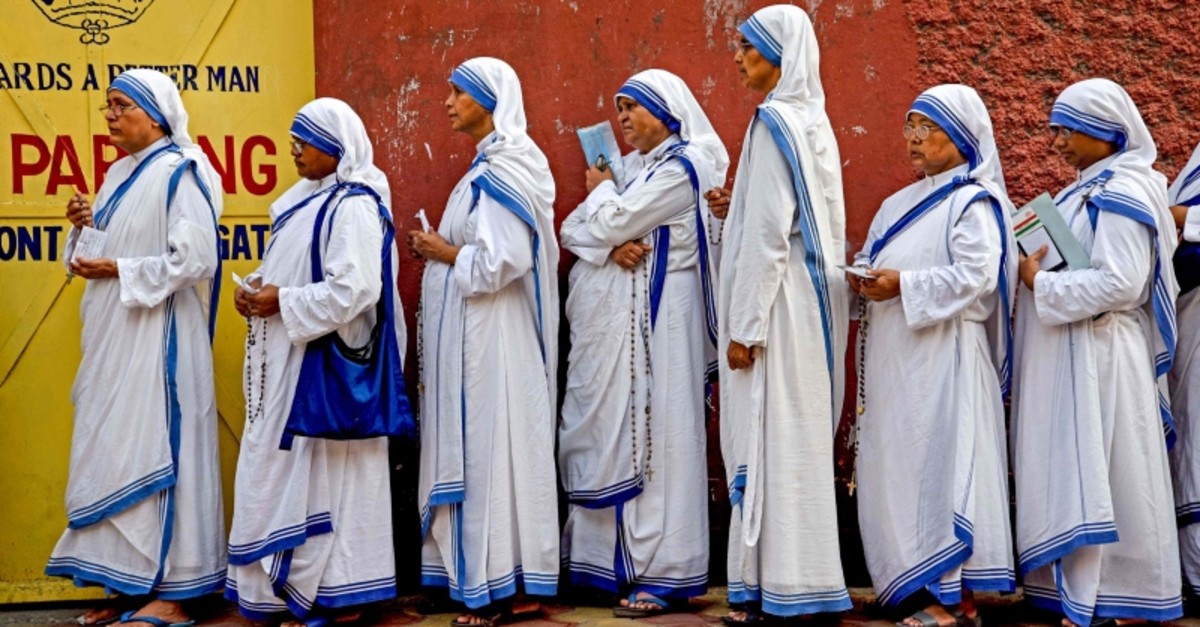
Indian Prime Minister Narendra Modi appears to be headed for a second term as premier, with exit polls predicting a majority for his Hindu nationalist Bharatiya Janata Party in the general elections.
The BJP-led National Democratic Alliance is projected to win anywhere between 287 to 306 seats in the 545-seat parliament, four exit polls showed.
Its rival Congress party-led United Progressive Alliance is likely to secure between 128 to 132 seats.
A political party or alliance needs at least 272 seats to get a majority in the parliament.
Results will be announced on May 23. Political analysts warn that India's exit polls have a reputation for being inaccurate given the size and complexity of the electorate.
Sunday's final round of election included 59 constituencies in eight states. Up for grabs are 13 seats in Punjab and an equal number in Uttar Pradesh, eight each in Bihar and Madhya Pradesh, nine in West Bengal, four in Himachal Pradesh and three in Jharkhand and Chandigarh.
In Kolkata, the capital of West Bengal, voters lined up outside polling stations beginning in the early morning to avoid scorching heat with temperatures reaching up to 38 degree Celsius (100.4 Fahrenheit). Armed security officials stood guard in and outside the centers amid fear of violence.
While the election since April 11 has been largely peaceful, West Bengal state in eastern India is an exception. Modi is challenged here by Chief Minister Mamata Banerjee, who heads the more inclusive Trinamool Congress party and eyes a chance to go to New Delhi as the opposition's candidate for prime minister.
Modi has visited West Bengal 17 times in an effort to make inroads with his Hindu nationalist agenda that had provoked sporadic violence and prompted the Election Commission to cut off campaigning.
Prodeep Chakrabarty, a retired school teacher in Kolkata, said Modi's Bharatiya Janata Party was desperate to win some seats against Banerjee's influential regional party.
"People are divided for many reasons, we have to wait for a final outcome to see who people are voting for. Things are not predictable like before," he said.
Minorities in India, especially Muslims who comprise about 14% of India's 1.3 billion people, criticize Modi for his Hindu nationalist agenda. Modi has issues to deal with neighboring Muslim-majority Bangladesh because his party backed a bill that would make it easier to deport millions of Bangladeshis who migrated to India since Bangladesh's independence in 1971. The bill, however, eases a path to citizenship for Hindus, Sikhs, Parsees and Jains — non-Muslims — who came from Afghanistan, Bangladesh and Pakistan over decades.
Voters were also up early in Varanasi in Uttar Pradesh state, where election workers arranged for drinking water, shade and fans to cool them down.
"I straightaway came from morning walk to cast my vote and was surprised to see enthusiasm among the voters," said Ramesh Kumar Singh, who was among the first ones to vote. "There were long queues of people waiting patiently to cast their votes, which is a good sign for democracy."
The election is seen as a referendum on Modi's five-year rule. He also played up the threat of Pakistan, India's Muslim-majority neighbor and archrival, especially after the suicide bombing of a paramilitary convoy on Feb. 14 that killed 40 Indian soldiers.
The BJP's main opposition is Congress party, led by Rahul Gandhi, the scion of the Nehru-Gandhi dynasty that has produced three prime ministers. Congress and other opposition parties have challenged Modi over a high unemployment rate of 6.1% and farmers' distress aggravated by low crop prices.
Some of Modi's boldest policy steps, such as the demonetization of high currency notes to curb black-market money and bring a large number of people into tax net, proved to be economically damaging. A haphazard implementation of "one nation, one tax"— goods and services tax —also hit small and medium businesses.
Voter turnout in the first six rounds was approximately 66%, the Election Commission said, up slightly from 58% in the last national vote in 2014.
